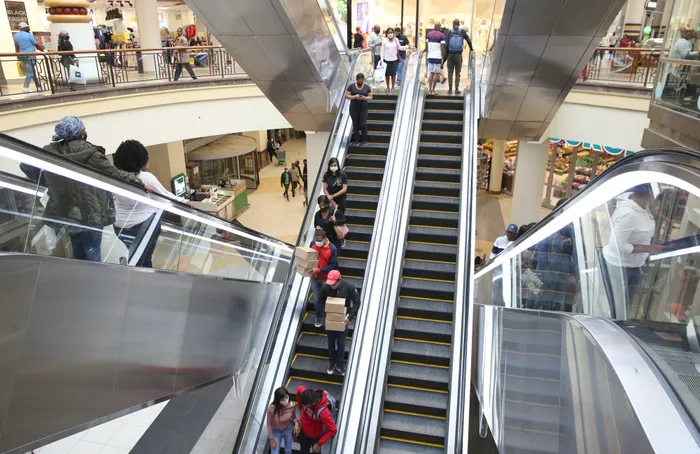Retail sales data reflects a sector hit by weak consumer confidence

Retail trade sales recorded the 7th consecutive real year-on-year (y/y) decline of 0.9% in June as consumer spend remained constrained, while retailer confidence was depressed amid a moribund economy. Picture: Zanele Zulu/African News Agency (ANA)
Retail trade sales recorded the 7th consecutive real year-on-year (y/y) decline of 0.9% in June as consumer spend remained constrained, while retailer confidence was depressed amid a moribund economy
Statistics South Africa said yesterday that this followed May’s -1.6% y/y revised slide. The result was also weaker than consensus projections of Bloomberg of a 0.2% y/y lift.
The largest negative contributors to the y/y decrease in June were general dealers (-2.7%) and retailers in hardware, paint and glass (-4.4%).
Seasonally adjusted retail trade sales increased 0.2% in June 2023 compared with May 2023. This followed month-on-month changes of -0.9% in May 2023 and 0.2% in April 2023.
Retail trade sales fell by 1.4% in the second quarter compared with the second quarter of 2022.
The largest negative contributors to the quarterly y/y decline were general dealers (-3%) and retailers in hardware, paint and glass (-4%).
Textile, clothing, footwear and leather goods retailers were the only positive contributors (5.7%).
Investec economist Lara Hodes said in a note that the retail sales data was weaker than consensus projections (Bloomberg) of a 0.2% y/y lift.
“Measured on a quarter-on-quarter seasonally adjusted basis retail trade sales declined by -1%, accordingly, the trade sector is likely to detract from the quarter’s headline GDP reading,” said Hodes.
Hodes said confidence among retailers was generally depressed and fell by a notable 14% points to 20% in the recent second quarter RMB/BER business confidence survey, with respondents attributing the fall in sentiment to in part a “marked deterioration in profitability on the back of soaring load-shedding related costs”.
She said consumers remained financially constrained dealing with elevated living costs, high interest rates and accordingly lower purchasing power.
Measured on a year-on-year basis “real take-home pay remained “in negative territory in June” according to BankservAfrica, “but less so compared to the previous two months”.
FNB Commercial Property Finance Property Sector Strategist John Loos said in a note June’s retail sales had recorded the 7th consecutive real year-on-year decline.
“Hopefully, this slower rate of real decline points to a levelling out in real retail sales,” he said.
However, he said the declining June 2023 real retail sales numbers pointed to a likely continuation of the recent weakening in the retail property market on a national basis.
Loos said even the less cyclical ‘General Dealers’ saw a decline of -2.7% after a slowing economy and significantly higher food and grocery prices (after last year’s inflation surge) exerted pressure on real consumer disposable income.
He said there was also pressure in home-related retail: “Household furniture, appliances and equipment” retail declining by -1%, and “Hardware, paint and glass” retail sales by an even larger -4.4% year-on-year.
“Declines in these two latter categories makes sense, given many home-related purchases and maintenance items are postpone-able in tough financial times. Pharmaceutical and Health Care Retailers saw a -1.4% year-on-year real decline, and the large “Other Retailers” category saw a -1.6% decline, so the decline was broad-based across the major retail categories,” he said.
He said this data sustained pressure on retail shopping centre tenants, and thus on the centres themselves, likely having caused further slowdown in growth in retail centre trading densities during the second quarter of 2023.
“Declining real retail sales comes at a time when shopping centre owners and tenants alike face significant operating cost pressures too, including often above-inflation municipal tax and utilities tariff hikes, while also required to find costly electricity alternatives due to unreliable power supply,” he said.
BUSINESS REPORT
Related Topics: